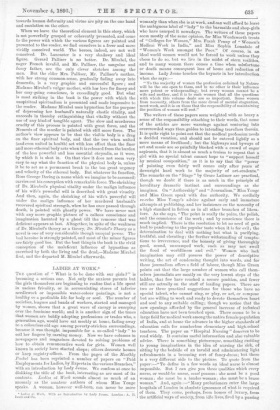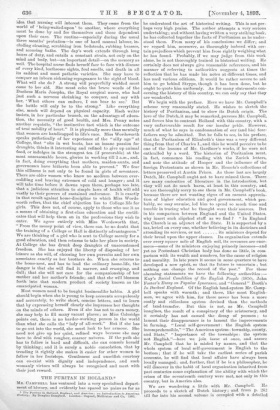LADIES AT WORK.* THE question of " What is to
be done with our girls P" is becoming a serious one. Not.only the anxious parents but the girls themselves are beginning to realise that a life spent in useless frivolity, or in accumulating stores of inferior needlework or impossible water-colour paintings, is not a healthy or a profitable life for body or soul. The number of societies, leagues and bands of workers, started and managed by women, shows that a great wave of energy is sweeping over the feminine world; and it is another sign of the times that women are boldly adopting professions or trades who, a generation ago, would have sat meekly at home, fading away to a colourless old age among poverty-stricken surroundings, because it was thought impossible for a so-called " lady " to soil her fingers by earning money. Now we have columns in newspapers and magazines devoted to solving problems of how to obtain remunerative work for girls. Women well known in society have started shops ; others decorate houses or keep registry-offices. From the pages of the Monthly Packet has been reprinted a number of papers on "Paid Employments for Ladies, by Experts in the various Branches," with an introduction by Lady Jenne. We confess at once to disliking the title of the book, interesting as are most of its contents. Ladies, at Work sounds almost as much of an anomaly as the amateur authors of whom Miss Yonge speaks. A woman, however well-born, can never be more Ladies at Work. With an Introduotion by Lady Jenne. London : A. D. Innes and Co. womanly than when she is at work, and can well afford to leave the ambiguous label of " lady " to the barmaids and shop-girls who have usurped it nowadays. The writers of these papers seem mostly of the same opinion, for Miss Wordsworth treats of " Colleges for Women," Mrs. Frank Penny of " Women's Medical Work in India," and Miss Sophia, Lonsdale of " Women's Work amongst the Poor." Of course, in an ideal world women would not be forced to work unless they chose to do so, but we live in the midst of stern realities, and to many women there comes a time when misfortune or death means consequent loss of home and reduction of income. Lady Jenne touches the keynote in her introduction when she says :- " To the majority of women the profession ordained by Nature will be the one open to them, and in no other is their influence more potent or widespreading; but every woman cannot be a wife and mother, and it is to such women that all the questions with which this volume deals are so important. Some women from necessity, others from the mere dread of mental stagnation, must work, and it is on these that the responsibility of maintaining the position of women will rest."
The writers of these papers seem weighted with so heavy a sense of the responsibility attaching to their words, that some of the articles are more warnings against venturing into overcrowded ways than guides to intending travellers therein.
It is quite right to point out that the medical profession needs, a decided vocation, and should not be entered lightly as a mere means of livelihood ; but the highways and byways of art and music are so painfully blocked with a crowd of eager aspirants, that it is almost as much a truism to repeat that a girl with no special talent cannot hope to "support herself by musical composition," as it is to say that the "power of painting even fairly well comes only after years of downright hard work to the majority of art-students." The remarks on the "Stage" by Grace Latimer are practical, though we doubt if there is as much in the principle of hereditary dramatic instinct and surroundings as she imagines. On " Authorship " and " Journalism," Miss Yonge and Miss Green speak with due authority. We cordially re-echo Miss Yonge's advice against early and immature attempts at publishing, and her insistence on the necessity of a high standard in fiction as in all other branches of litera- ture. As she says, "The point is really the pains, the polish, and the conscience of the work ; and by conscience there is much implied. There is the resolution to let no need of gain lead to pandering to the popular taste when it is for evil; the determination to deal with nothing but what is purifying, truthful, and elevating ; the further withstanding of tempta- tions to irreverence, and the honesty of giving thoroughly good, sound, miscamped work, such as may not swell the flood of worldliness and evil." Women who lack imagination may still possess the power of descriptive writing, the art of condensing thought into words, and for these journalism offers a field of labour, though Miss Green points out that the large number of women who call them- selves journalists are mostly on the very lowest steps of the ladder, that few have reached a secure position, and fewer still are actually on the staff of leading papers. There are two or three practical suggestions for those who have no special talent, who cannot sing, or play, or act, or compose but are willing to work and ready to devote themselves heart and soul to any suitable calling; though we notice that the new openings afforded by the general increase of technical education have not been touched upon. There seems to be a large field for medical work among the native female population of India, and at home the advance in the higher standards of education calls for numberless elementary and high-school teachers. The paper on " Hospital Nursing " deserves to be read widely. It contains useful information and also valuable advice. There is something picturesque, something exciting to young imaginations in the idea of nursing the sink, of sitting by the bedside of an invalid and administering light refreshments in a becoming sort of fancy-dress; but there is a. very different side to the picture. To quote from the paper :—" To define in a few words an ideal nurse is almost impossible. But I can give you three qualities which every nurse, or would-be nurse, must possess ; she must be a good woman ; she must be a tender woman ; she must be a brave woman." And, again :—" Many probationers enter the large hospitals of London in absolute ignorance of what is required of them. They come, perhaps, from homes of luxury, from the artificial ways of society, from idle lives, fired by a passing idea that nursing will interest them. They come from the world of ' being-waited-upon' to another, where everything must be done by and for themselves and those dependent upon their care. The routine—especially during the usual three months' probation—is one of hard manual labour, in- cluding cleaning, scrubbing iron bedsteads, rubbing brasses, and scouring baths. The day's work extends through long hours of duty, and entails a constant strain, not only on the mind and body, but—an important detail—on the memory as well. The hospital nurse finds herself face to face with disease of every kind, loathsome sights, foul smells, and death in all its saddest and most pathetic varieties. She may have to conquer an inborn sickening repugnance to the sight of blood. What will she do P A strong will prayerfully wielded must come to her aid. She mast echo the brave words of the Duchess Maria Josephs, the Royal surgical nurse, who had just such a nervous shrinking to conquer, and say with her, ' What others can endure, I can bear to see.' But the battle will only be to the strong." Like everything else, much will depend on physical capacity. Each writer insists, in her particular branch, on the advantage of educa- tion, the necessity of good health, and Mrs. Penny notes another requisite, "the instinctive tact which is the outcome of true nobility of heart." It is physically more than mentally that women are handicapped in life's race. Miss Wordsworth speaks pathetically of her experience of the "silly age" at College, that " sits in wet boots, has an insane passion for draughts, thinks it interesting and refined to give up animal food, or indulges in the strongest tea (if procurable) at the most unseasonable hours, glories in working till 2 a.m., and, in fact, doing everything that mothers, maiden-aunts, and governesses have hitherto been able to prevent." We fear this silliness is not only to be found in girls of seventeen. There are older women who know no medium between over- coddling and braving extremes of cold and hunger ; and it will take time before it dawns upon them, perhaps too late, that a judicious attention to simple laws of health will add vastly to their powers of sustained endurance. It is exactly in that revolt against home-discipline to which Miss Words- worth refers, that the chief objection lies to College life for girls. This does not, of course, apply to those who use it as o. means of obtaining a first-class education and the certifi- cates that will help them on in the professions they wish to enter. We agree entirely with Miss Wordsworth that, "From the money point of view, there can be no doubt that the training of a College or Hall is distinctly advantageous." We are thinking of a girl who is sent to College merely for a good education, and then returns to take her place in society. At College she has drunk deep draughts of unaccustomed freedom. She has enjoyed the liberty of disposing of her leisare as she will, of choosing her own pursuits and her own associates exactly as her brothers do. When she returns to the home-nest, and has to lead the ordinary home-life, the danger is that she will find it narrow, and cramping, and null; that she will not care for the companionship of her mother and her mother's friends ; and that she will blossom forth into that modern product of society known as the emancipated woman.
Most women need to be taught businesslike habits. A girl should begin when f:Ibe is young to keep accounts scrupulously and accurately, to write short, concise letters, and to learn that by expressing herself clearly she impresses her thoughts on the minds of others. Even if she has not to earn money, she may help to fill many vacant places ; as Miss Coleridge points out, there is no harder-working person in the world 'than what she calls the "lady of all-work." But if she has to go out into the world, she must look to her armour. She need not give up her quiet, refined ways because she may have to deal with rougher, coarser natures. If the path she has to follow is hard and difficult, she can console herself by thinking ; and it is surely a noble consolation, that by treading it rightly she makes it easier for other women to follow in her footsteps. Gentleness and unselfish courtesy can co-exist with dignity and independence, and such womanly virtues will always be recognised and meet with their just reward.





















































 Previous page
Previous page